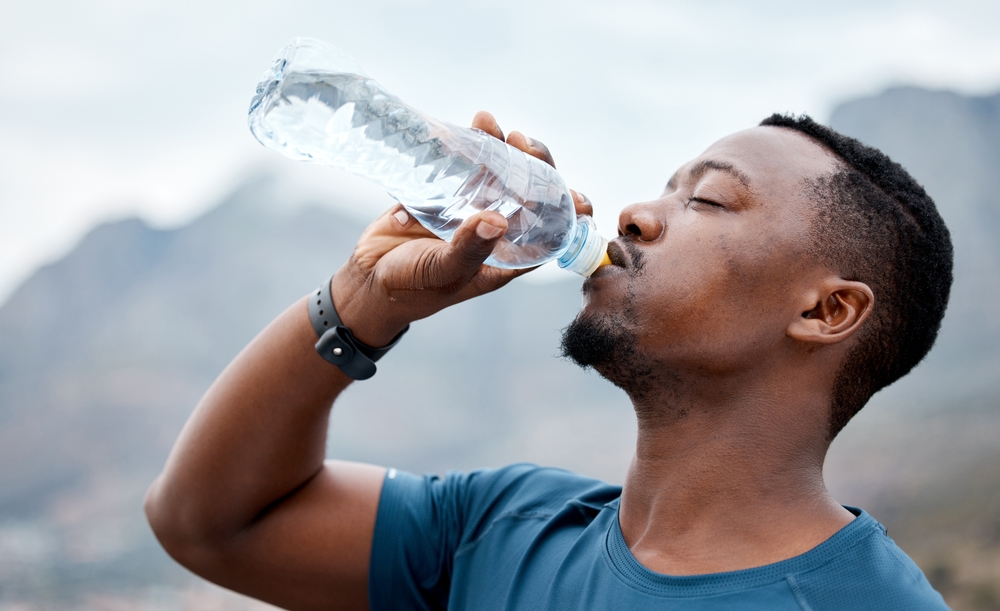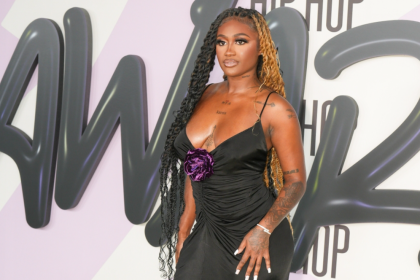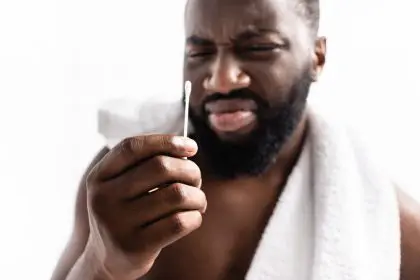We’ve all heard the usual advice about drinking eight glasses of water a day. But let’s be real—most of us aren’t hitting that target consistently. You might think you’re doing fine because you’re not desperately thirsty, but your body could be sending you some seriously weird signals that you’re running dry.
Forget dramatic desert-crawling thirst. Dehydration in real life is sneakier than that. It shows up as strange symptoms you’d never connect to your water intake. That headache? Those weird cravings? Your sudden clumsiness? All potential signs that your inner water reservoir is running low.
That unexplained brain fog isn’t just Monday blues
Ever feel like your brain suddenly got wrapped in cotton wool? Tasks that should be simple become strangely difficult. You read the same email three times and still can’t figure out what it’s asking for. Words you use every day suddenly escape you mid-sentence.
Before you blame lack of sleep or too many meetings, consider this: your brain is roughly 75% water. Even mild dehydration—we’re talking just 1-2% below optimal—can mess with your cognitive function in measurable ways.
When your brain can’t maintain its proper water balance, neural transmission slows down. It’s like trying to send a text message with one bar of service. The information eventually gets there, but much more slowly and with potential errors along the way.
The fix is simpler than any productivity hack: drink a full glass of water. Many people report that mental clarity returns within 20-30 minutes after proper hydration. It’s like defragging your human computer.
Your food cravings might actually be water cravings in disguise
Suddenly desperate for salty chips or something sweet? Before you raid the snack drawer, try drinking water first. Your body often confuses thirst and hunger signals because they originate in the same part of the brain.
This mixup is especially common with salt cravings. When you’re dehydrated, your body’s electrolyte balance gets disrupted. Your brain might interpret this as needing more sodium, triggering intense cravings for salty foods. But what you really need is water to dilute and rebalance your existing electrolytes.
Fruit cravings can be another hydration red flag. That sudden urge for watermelon or grapes might be your body’s clever way of trying to get you to consume water-rich foods when it senses dehydration.
Next time an intense craving hits, try this experiment: drink a full glass of water and wait 15 minutes. If the craving subsides, you weren’t hungry at all—just thirsty.
That afternoon slump hits different when you’re dehydrated
We all know the post-lunch energy crash. But if yours feels particularly brutal—like someone suddenly replaced your blood with lead—inadequate hydration might be the culprit.
When you’re dehydrated, your blood volume decreases, which means your heart has to work harder to pump oxygen and nutrients throughout your body. This extra cardiac effort diverts energy from other systems, leaving you feeling like you’ve suddenly aged 40 years.
The timing matters too. Many people front-load their water intake, drinking a decent amount in the morning but tapering off as the day progresses. By mid-afternoon, they’re running on fumes hydration-wise, which perfectly coincides with the natural circadian dip in energy.
The solution isn’t necessarily another coffee—which can actually worsen dehydration—but rather consistent water intake throughout the day. Keep track of your afternoon energy level on days when you maintain steady hydration versus days when you don’t, and you’ll likely spot a significant difference.
Your sudden clumsiness has a surprising cause
Tripping over nothing? Dropping things more often? Misjudging distances? Before you write yourself off as naturally uncoordinated, check your water intake.
Dehydration affects your balance and coordination through multiple mechanisms. First, it can lower blood pressure, which might cause momentary dizziness. Second, it slows nerve transmission, making your reaction time slightly delayed. Third, it can affect the fluid in your inner ear, which is crucial for balance.
The result? You become the human equivalent of a smartphone with a dying battery—functional but glitchy, dropping calls and crashing apps.
This connection between hydration and coordination is why athletic trainers are obsessive about their players’ water intake. Even small decreases in hydration status have been shown to impact performance in tasks requiring precision and coordination.
That killer headache might not need painkillers at all
Next time a headache strikes, especially if it feels like a tight band squeezing your head, try water before reaching for pain relievers. Dehydration headaches are remarkably common but frequently misdiagnosed as tension headaches or even migraines.
When your body loses too much water, your brain can actually temporarily contract or shrink away from the skull slightly. This triggers pain receptors in the meninges—the membrane surrounding your brain—resulting in that familiar throbbing ache.
What makes dehydration headaches tricky to identify is that they often don’t go away instantly upon drinking water. It can take anywhere from 30 minutes to three hours for the body to rehydrate sufficiently to relieve the pain. This delayed relief leads many people to dismiss water as ineffective when it was exactly what they needed—just with a bit of patience.
Your lips are telling a hydration story
Chapped lips have many causes, from weather to allergic reactions. But before you blame the wind or your new lip balm, consider whether dehydration might be the real culprit.
Unlike most skin on your body, lips don’t contain oil glands, making them especially vulnerable to drying out. They act as an early warning system when your overall hydration drops. The tissue becomes less plump, more prone to cracking, and may even develop small vertical lines that weren’t there before.
Counterintuitively, constantly licking your lips actually worsens this condition. Your saliva contains digestive enzymes that can further irritate the delicate skin. Plus, the momentary moisture followed by evaporation ultimately leaves your lips drier than before.
The real solution is working from the inside out. Consistent water intake keeps your skin cells—including those on your lips—properly hydrated. Many people notice that even their most stubborn lip dryness improves when they increase their overall fluid intake.
Your bathroom visits hold hydration clues
Nobody likes talking about it, but your urine color is one of the most reliable indicators of your hydration status. Dark yellow or amber-colored urine typically signals that you need more water, while pale straw-colored urine suggests adequate hydration.
But beyond color, frequency offers another clue. Contrary to what you might think, infrequent bathroom visits aren’t a sign of good hydration—they often indicate the opposite. When properly hydrated, most people urinate roughly 4-7 times per day.
Going less often usually means your body is conserving water by concentrating your urine. This not only leads to darker color but can increase your risk of kidney stones and urinary tract infections, as bacteria have more time to multiply in more concentrated urine.
Your temperature regulation gets weird when you’re dry
Finding yourself suddenly freezing in a room that’s perfectly comfortable for everyone else? Before blaming the air conditioning, consider your water intake. Dehydration can actually impair your body’s ability to regulate temperature effectively.
Water plays a crucial role in your body’s thermoregulation system. When properly hydrated, your blood can efficiently distribute heat throughout your body and release it through your skin when necessary. With inadequate water, this system becomes less effective, making you more sensitive to environmental temperature changes.
This connection explains why dehydration can make you feel inexplicably cold even in mild conditions. Ironically, it can also make you more vulnerable to overheating, as your body struggles to maintain its core temperature without sufficient water reserves.
The hydration sweet spot isn’t what you think
The old “eight glasses a day” rule is outdated and oversimplified. Your optimal water intake depends on multiple factors including your body size, activity level, climate, diet, and even the medications you take.
A more personalized approach means paying attention to your body’s signals and adjusting accordingly. Beyond watching for the weird symptoms we’ve discussed, aim for pale yellow urine and regular bathroom visits throughout the day.
Don’t discount water from food sources either. Fruits and vegetables can contribute significantly to your daily water intake. Watermelon, cucumber, strawberries, and leafy greens are all over 90% water by weight.
Timing matters too. Front-loading your water intake by drinking a large glass first thing in the morning helps replenish what you’ve lost during sleep. Similarly, drinking water about 30 minutes before meals helps with digestion and can prevent overeating.
The bottom line? Your body has been telling you what it needs all along—just not in the ways you expected. Those strange symptoms aren’t random glitches in your human operating system. They’re sophisticated alerts telling you exactly what you need: another glass of water.
















